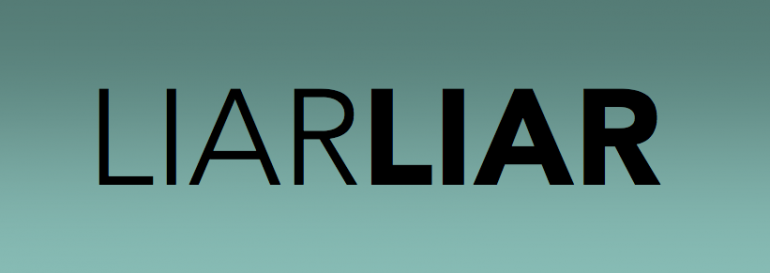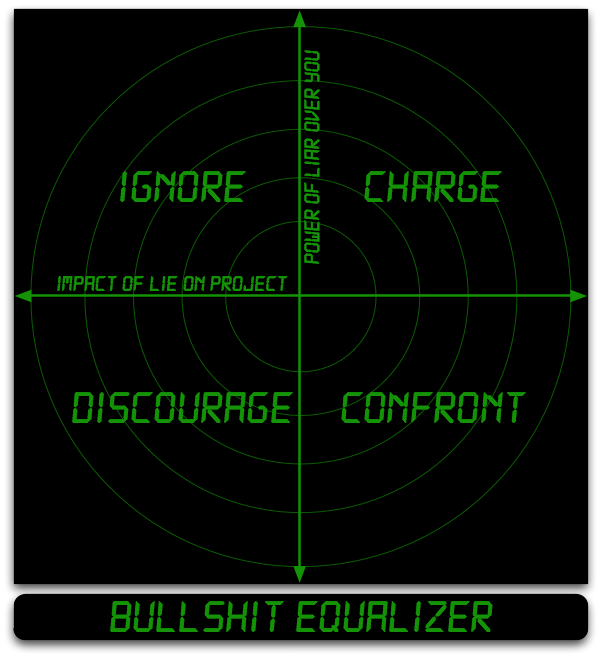5 Tips on Dealing with Liars

So you’ve kicked off your project, and things are well underway. You followed all the best practices; you did everything you learned in the project management manuals. Everyone knows their roles, responsibilities, and how they’re expected to interact with one another. There’s just one small problem.
Someone on your project team has a habit of telling you and others on your team bald-faced lies.
Oh, there’s always reasons for the lies, and many times those reasons can be spun into really good arguments. In twenty years of managing projects, believe me, I’ve heard just about every excuse there is for the lies people tell. Do any of these sound familiar?
- “I didn’t want to get caught doing something I shouldn’t have.”
- “I was afraid of what would happen if I told the truth.”
- “I needed to close the sale.”
- “It wasn’t true then but I thought for sure it soon would be.”
- “I’m just being politically savvy.”
- “It’s in everyone’s best interest.”
- “It won’t hurt anyone, it’s harmless.”
- “Nobody wants to hear the truth.”
- (or my personal favourite) “It’s in the name of transparency.”
Merriam-Webster defines a “lie” as follows:
Function: noun
Etymology: Middle English lige, lie, from Old English lyge; akin to Old High German lugī, Old English lēogan to lie
Date: before 12th century
1 a : an assertion of something known or believed by the speaker to be untrue with intent to deceive b : an untrue or inaccurate statement that may or may not be believed true by the speaker
2 : something that misleads or deceives
3 : a charge of lying
Here’s one approach for dealing with lies!
From The Adventures of Sherlock Holmes’ Smarter Brother
Regardless of the reasons, ethics or personal morality behind the lie, there are always consequences. Project managers (and other team members) base decisions on the facts they believe to be true. Often, they’re not sufficiently versed in one or more aspects of the project they manage to know first hand whether or not the facts presented are accurate–to that end, they have to rely on the integrity of the people delivering information. If a decision based on false information results in rework, the project can get into trouble very quickly. Further, damaged trust can have a detrimental ripple effect on the team. What can a project manager do to bail the project out before it goes into a tailspin?
First of all, remember that projects are composed of many different people who relate to the project manager in different ways. The answer to this question is never simple. What if the person telling the lie is the project manager’s boss? Or account manager? Or stakeholder? As tempting as it can be to take a confrontational position on discovering someone’s lied, if they have power over the project manager, that could be akin to shooting oneself in the foot.
However, here’s some tips for dealing with the unpleasantness of lies on your project.
1) Don’t think you have special super powers.
Just as some people may be better at sniffing out lies than others, some are better at hiding lies than others too. Ultimately, the ability to detect a lie comes down to a crap shoot. While it would be really great to be able to catch every lie as they’re being told, it’s far more pragmatic to have strategies to deal with lies after the fact.
2) Give the benefit of the doubt, but never assume all information is 100% accurate.
The majority of people tell lies because they’re hoping to avoid something unpleasant. The most common form of these lies take the form of half-truths or omissions of information. It’s much rarer for someone to deliberately tell a lie that is 180 degrees away from the truth. Assume that the people you work with are generally honest, but constantly pressure for as many details as you can. If you don’t have a crystal clear picture of the facts at hand, you can’t make good decisions. So probe, probe, probe. If you catch details that indicate someone’s not being 100% truthful, do what you can to fill those holes, and then seek independent verification.
3) Ignore morality.
As a project manager, your job isn’t to pass judgement on anyone. People lie. People sneak. People look at porn on their computers during office hours. These are things that happen during the course of your projects and you need to accept that. What you have to worry about is getting the project done while these things are happening, so if you openly pass judgement, you’ll drive that behaviour further underground where you can’t see it. Ultimately, that’s just going to impair your ability to make effective decisions. You encourage truthfulness by being open yet non-judgemental.

4) Use the Bullshit Equalizer
Okay, so you’ve caught someone in an outrageous, bald-faced lie, and work has to be redone as a result. You’re now into damage control mode. Assess the person who’s told you the lie, and answer two questions: a) How much power does this person have over you? Are they a client? A stakeholder? An account executive? Your boss? and b) What is the impact of the lie on your project? Will the lie cause rework or otherwise harm your deliverables?
Depending on the answers to those two questions, you can reasonably drop your response into one of four quadrants.
a) Ignore. Just let the lie go. The amount of effort it would require for you to deal with the lie is greater than the consequences of not dealing with it.
b) Discourage. Discourage the behaviour. While the impact of the lie may be negligible, you don’t want to create a climate where this sort of behaviour is acceptable. You don’t want others seeing that you think it’s okay to tell lies, and you don’t want the offender to make a habit of lying. In this case a mild confrontation is acceptable. Let the person you know they lied, and that you’d prefer they’d just be honest with you. But don’t make it a big deal.
c) Confront. Sometimes you need to take a harder line with the liar because the lie has had an impact on the project. In this case, you need to take them aside and specifically address the lie. This should be done immediately.
d) Charge. This is the toughest course of action. If the person has power over you and their lie has harmed your project, you need to take swift action. First, assess the impact of the lie…what are the costs to the schedule, budget and quality? You need to bring those costs to the offender and lay them on the table. Together, you’re going to have to figure a way to address those costs.
5) Be crystal clear about consequences
If I choose to deal with a lie head-on, I generally take a “three strikes and you’re out” policy, with harsher, but related consequences each time. No matter who on your project you’re dealing with, I find this approach works well.
For example, in the face of a client who I’ve caught in a lie that could potentially hurt the project, I’ve used the following:
Strike #1: Tally the cost of the lie, confront the client, outline strikes #2 and #3.
Strike #2: Tally the cost of the first two lies, stop all work, request the client find additional funding before proceeding.
Strike #3: Tally the cost of all three lies, stop all work, inform the client’s management, request a replacement from the client’s management before proceeding, or close up the project.
I lay these consequences down in the very first discussion I have with the client after I found they’ve lied to me, so there’s no ambiguity the next time it happens (and I’m prepared for a next time). I follow through on these consequences immediately after a private discussion with the client. By doing so, I’ve occasionally gotten to strike #2 (usually because the client didn’t believe me in the first discussion after strike #1), but never gotten to strike #3.
The trick is to be up front, swift and consistent in dealing with lies. You don’t need to be a monster about it, but you do need to make good on your promises.How about you? As we all have to work with other people, lies are a fact of life. How do you contend with lies in your project environments?
Related articles by Zemanta
- Nine Destructive Project Manager Behaviours: Part 4 of 9 (edge.papercutpm.com)
- Nine Destructive Project Manager Behaviours: Part 3 of 9 (edge.papercutpm.com)
- Nine Destructive Behaviours Gets Props! Also, a Quote at the PMI (edge.papercutpm.com)
- What Makes a Good Project Manager? (brighthub.com)
- Why Project Managers Are More Likely to Become Linchpins (corporategeek.info)
- Basic Principles of Communication (brighthub.com)




